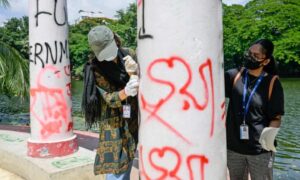
Students are out in force on the streets of Dhaka, no longer protesting but working to put a city back together after the dramatic events of the past few days. After Monday’s resignation of Bangladesh’s prime minister, Sheikh Hasina, subsequent looting and pockets of violence meant the initial jubilation quickly turned to concern.
There were reports that the offices of the ruling Awami League party, as well as homes and businesses of the minority Hindu population, were being attacked.
During the past two days, students have been out cleaning up roads and wreckage, while groups of volunteers have formed to protect the religious sites of minorities.
“We’re living in extraordinary times,” one volunteer says, while clearing glass and debris from a destroyed police box at a busy intersection in the city’s Mirpur neighbourhood.
“Protests can lead to unintended consequences, but they’re driven by a cause. Now, it’s our responsibility to help restore normalcy. We’re just doing our part.”
Nearby, students direct Dhaka’s notorious traffic, as police officers have deserted traffic posts or been deployed elsewhere. Holding up handmade signs saying: “Stop! Follow the traffic rules”, the students encourage pedestrians to keep to pavements and footbridges, and motorcyclists to wear helmets.
“Our protests might have ended, but our duty to the nation persists,” says 19-year-old Faiza.
The students are keen to protect their movement’s integrity, something that endeared it to Bangladeshi society and mobilised wider support for the protesters, who many in the country are saying have pulled off a gen Z-led revolution.
“I was there from the very first moment and have stayed with the movement because the quota law was against our rights, it was illogical. Students working by our own merit were being denied jobs,” says Ashin Roy, a 22-year-old student at Dhaka University.
“We really felt food good that everybody supported us and in the end, democracy has won,” says Roy. “We celebrated like we got our victory back, just like in 1971, but now I’m worried that the situation in my country is very bad, that minorities are being oppressed. I want an election now so the people can choose leader who truly works for us.”
